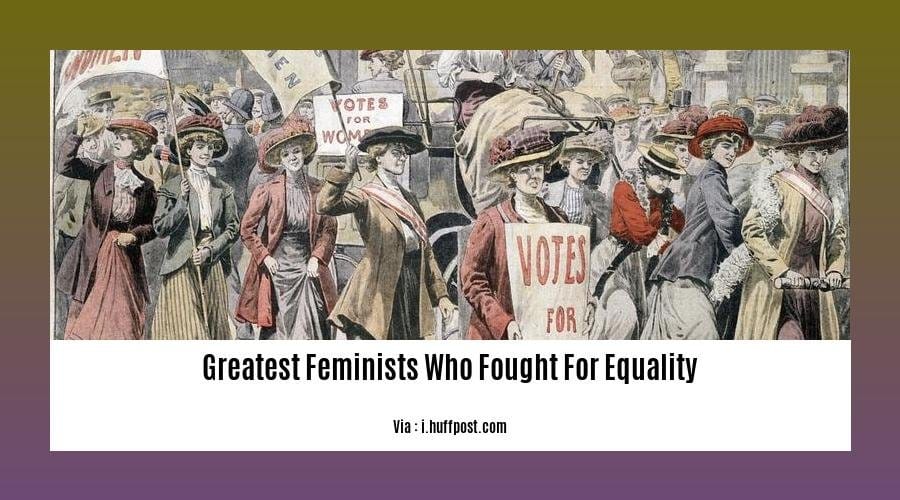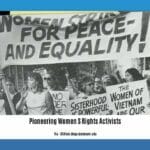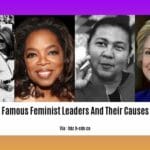Who are the greatest feminists who fought for equality? These remarkable women dedicated their lives to fighting for the rights of women and girls, and their work has had a profound impact on the world. From the suffragettes who fought for the right to vote to the activists who campaigned for equal pay and reproductive rights, these feminists have made a lasting difference in the fight for gender equality.
Key Takeaways:
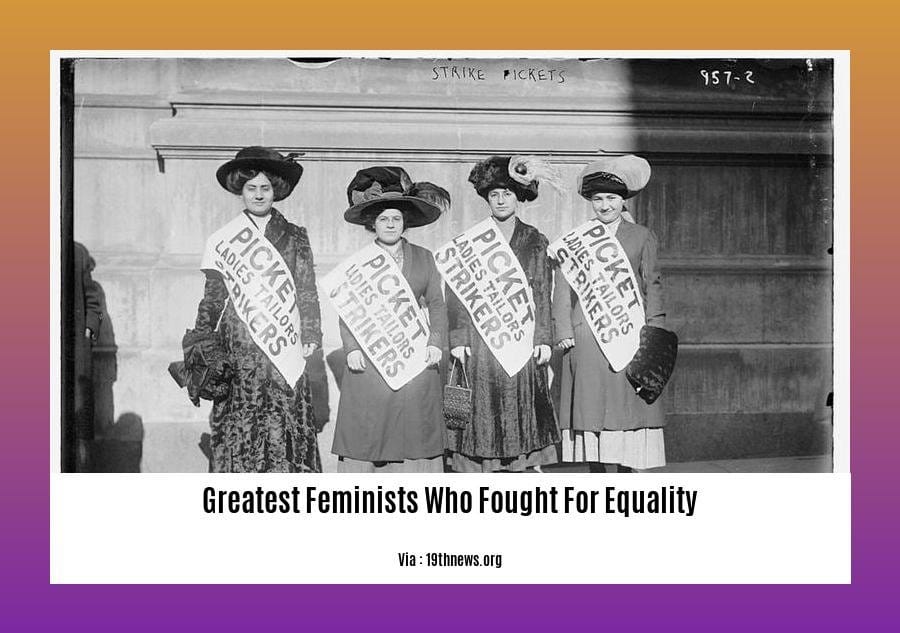
- Susan B. Anthony, Eleanor Roosevelt, and Sojourner Truth led the fight for women’s suffrage in the 19th and 20th centuries.
- Betty Friedan and NOW sparked the Second Wave of Feminism, advocating for equality and anti-discrimination.
- Malala Yousafzai and others continue to fight for education and women’s rights worldwide.
- The Suffragettes and Women’s March have played pivotal roles in advancing feminist causes.
- Feminism has evolved through several waves, each focusing on different aspects of gender equality.
- Celebrities like Sophia Bush and Beyoncé use their platforms to raise awareness and advocate for women’s rights.
Greatest Feminists Who Fought for Equality
Feminism has been an indispensable force in shaping the pursuit of gender equality, fueled by the unwavering efforts of remarkable individuals throughout history.
Pioneers of Gender Equality
Susan B. Anthony: A leading figure in the women’s suffrage movement, she played a pivotal role in securing voting rights for women in the United States.
Malala Yousafzai: A Pakistani activist, she fought for girls’ education, inspiring global awareness on the importance of equal access to education.
Eleanor Roosevelt: A renowned humanitarian, she advocated for social justice and human rights, particularly for women and children.
Waves of Feminism
First Wave Feminism: Focused on securing basic rights for women, such as property ownership and the right to vote.
Second Wave Feminism: Expanded the scope of feminist advocacy, addressing issues like reproductive rights, equal pay, and anti-discrimination.
Ongoing Advocacy
The feminist movement continues to evolve, with contemporary feminists like Sophia Bush, Beyoncé, and Jane Fonda raising awareness and advocating for equality in various fields.
The Enduring Impact
Social Transformation: Feminism has transformed societies by challenging traditional gender roles, empowering women, and promoting gender equality in all aspects of life.
Increased Awareness: It has brought greater attention to gender-based issues, leading to increased awareness and action against gender discrimination.
Continuing Struggle: Despite significant progress, challenges remain. The fight for gender equality is an ongoing one, requiring continued advocacy and support.
Call to Action
We must all recognize and honor the contributions of the greatest feminists who fought for equality. Their legacy inspires us to continue the struggle for a more just and equitable world where women’s rights and opportunities are fully realized.
Discover the extraordinary lives and contributions of influential feminist leaders and activists for women’s rights. From pioneers in the movement to famous feminist leaders and their causes, be inspired by the powerful stories of women who fought for equality. Explore the groundbreaking work of pioneering women’s rights activists who laid the foundation for the rights we enjoy today.
Audre Lorde: Poet, essayist, and activist known for her work on intersectionality
Key Takeaways:
– Audre Lorde was an American writer, feminist, and civil rights activist.
– She was a prominent figure in the women’s and LGBTQ rights movements.
– She is best known for her work on intersectionality, which examines how different forms of oppression overlap and affect individuals.
– Lorde’s work has inspired generations of activists and continues to be a source of strength and resilience for marginalized communities.
Lorde’s Life and Work
Audre Lorde was born in New York City in 1934. She was raised in a working-class family and attended Hunter College and Columbia University. Lorde began writing poetry in her early twenties, and her work quickly gained recognition for its power and honesty.
In the 1960s, Lorde became involved in the women’s and LGBTQ rights movements. She was a founding member of the Combahee River Collective, a group of black lesbian feminists who advocated for the rights of marginalized women.
- Lorde’s work is characterized by its focus on intersectionality.
- She argued that oppression cannot be understood in isolation, but rather must be seen as a system of interlocking oppressions.
- Lorde’s work has had a profound impact on the way we think about gender, race, and sexuality.
She was a prolific writer, producing poems, essays, and autobiographical works. Her work is known for its passion, honesty, and exploration of themes such as race, gender, sexuality, and social justice.
Legacy
Audre Lorde died of cancer in 1992. She left behind a legacy of activism and writing that continues to inspire and empower people today. Her work has been translated into over twenty languages, and she has been the subject of numerous books, articles, and documentaries.
Citation:
bell hooks: Author, feminist theorist, and cultural critic
A prolific feminist thinker, bell hooks challenged intersectionality, pushed boundaries, and inspired countless others in her relentless pursuit of equality. Here’s a glimpse into her remarkable journey:
Embracing Intersectionality: hooks’ unique lens on race, gender, and class sparked crucial conversations about the complex experiences of marginalized groups.
Challenging White Feminism: She fearlessly critiqued the exclusionary nature of second-wave feminism, empowering women of color to claim their rightful space within the movement.
Literary Brilliance: hooks’ extensive writings, characterized by their raw honesty and lyrical prose, captivated readers and ignited meaningful dialogue.
Key Takeaways:
- Hooks’ work laid bare the intersectional nature of oppression, pushing for inclusivity and equity.
- Her critique of white feminism shattered the monolithic perception of the movement, fostering a more diverse and representative agenda.
- hooks’ legacy as a prolific writer continues to inspire and empower activists and scholars alike.
Kimberlé Crenshaw: Coined the Term “Intersectionality”, Law Professor and Civil Rights Advocate
An Intersectional Lens to Dismantling Oppression
Kimberlé Crenshaw, a renowned law professor, and civil rights advocate, emerged as a pioneering force in the feminist movement with her groundbreaking concept of “intersectionality.” This transformative theory acknowledges the intricate interplay of diverse social identities—race, gender, class, etc.—and their profound impact on individuals’ experiences of oppression and discrimination.
Crenshaw’s seminal work illuminated the unique challenges faced by individuals whose identities intersect at marginalized positions. She coined the term “intersectionality” in 1989 to describe how these overlapping identities create distinct systems of inequality. Her analysis has profoundly influenced our understanding of systemic oppression, empowering activists and policymakers to address the multifaceted nature of social justice issues.
Key Takeaways:
- Intersectionality: A framework that recognizes the interconnectedness of social identities and their influence on oppression.
- Multiple Marginalization: Individuals with marginalized identities face unique forms of discrimination due to the intersection of their identities.
- Intersectional Analysis: Examining policies and interventions through an intersectional lens promotes equity and challenges systemic biases.
- Empowering Advocacy: Intersectionality empowers marginalized communities to advocate for their specific needs and challenges.
- Continued Relevance: The concept of intersectionality remains crucial in contemporary social justice movements, informing effective strategies for dismantling oppression.
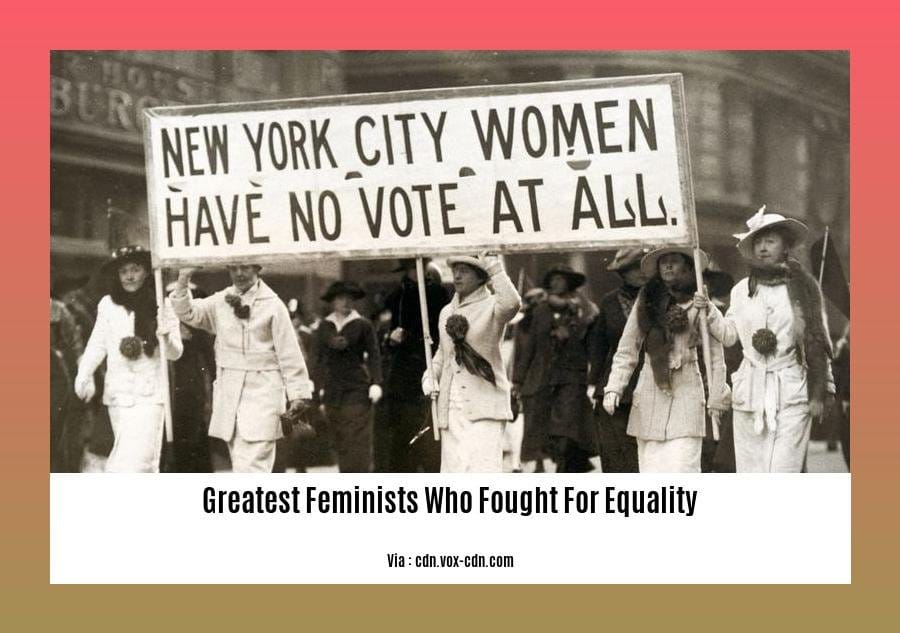
FAQ
Q1: Who were some of the most influential feminists in history?
A1: Prominent feminists throughout history include Susan B. Anthony, Eleanor Roosevelt, Simone de Beauvoir, Betty Friedan, and Audre Lorde.
Q2: What were the major waves of feminism?
A2: The first wave of feminism focused on property and voting rights, while the second wave emphasized equality and anti-discrimination laws.
Q3: What is the concept of intersectionality?
A3: Intersectionality acknowledges that individuals experience distinct forms of oppression and discrimination based on the intersection of their multiple identities, such as race, gender, and class.
Q4: What are some examples of feminist movements and organizations?
A4: Notable feminist movements and organizations include the Suffragettes, the National Organization for Women (NOW), and the Women’s March.
Q5: How can I get involved in the feminist movement today?
A5: There are various ways to support feminist causes, such as attending rallies, donating to organizations, and advocating for policies that promote gender equality.
- Unlock Water’s Symbolism: A Cross-Cultural Exploration - April 20, 2025
- Identify Black and White Snakes: Venomous or Harmless? - April 20, 2025
- Unlocking Potential: Origins High School’s NYC Story - April 20, 2025
